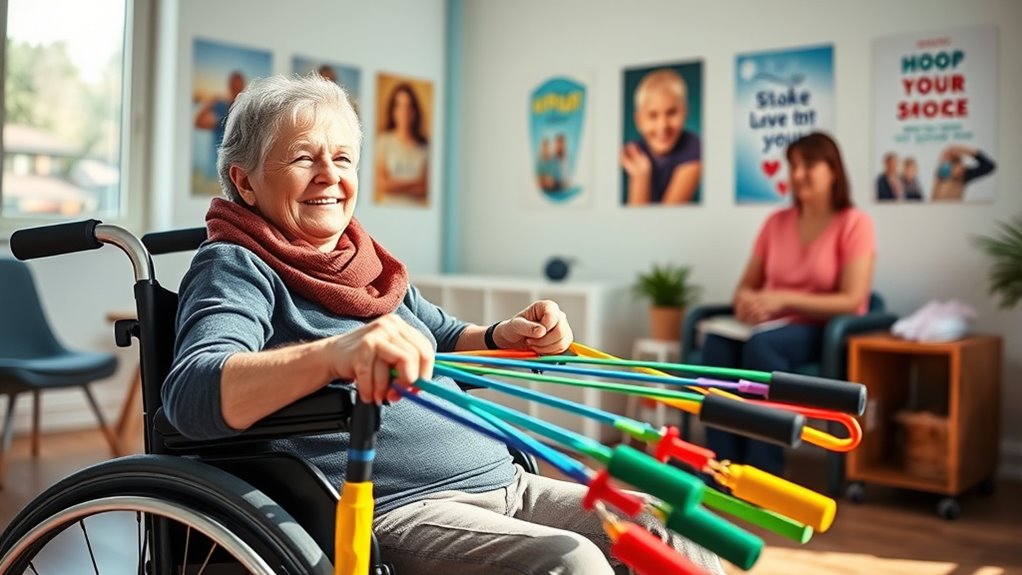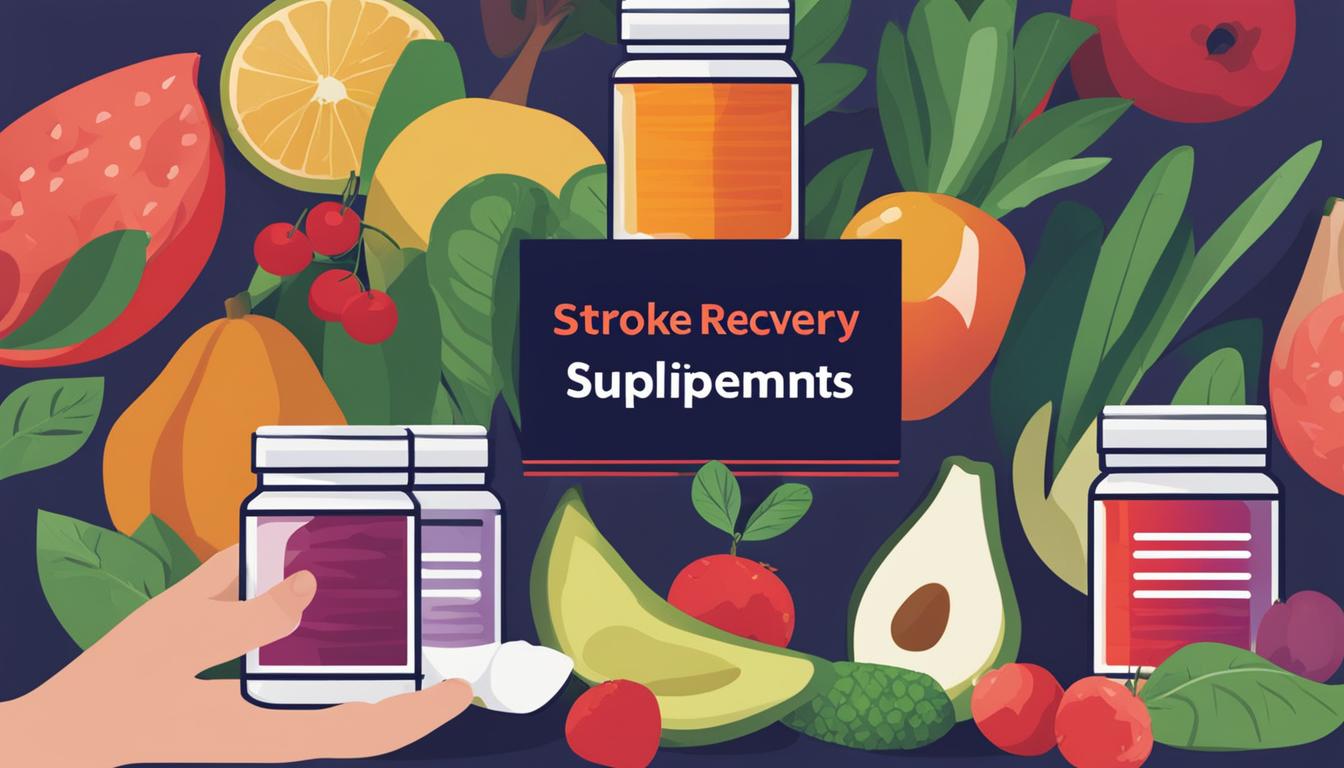To motivate a stroke survivor, use assistive technology like speech apps or mobility aids to show tangible progress. Offer emotional support by celebrating small victories and reminding them of their strengths. Set achievable goals and break tasks into manageable steps to prevent overwhelm. Create a routine and involve them in decisions to boost confidence. Staying patient, encouraging, and providing a supportive environment can keep motivation high. Keep going, and you’ll uncover even more ways to support their recovery.
Key Takeaways
- Incorporate assistive technology to showcase progress and boost confidence in recovery efforts.
- Provide emotional support through encouragement, patience, and celebrating small achievements.
- Set realistic, incremental goals to maintain motivation and demonstrate steady improvement.
- Engage survivors in routines, activities, and decision-making to foster a sense of control and purpose.
- Maintain a supportive environment with consistent caregiver presence and social connections to sustain morale.

Motivating a stroke survivor can be challenging, but your support is essential for their recovery journey. When it comes to keeping their spirits high and encouraging consistent effort, understanding how assistive technology can play a vital role is crucial. These tools can help your loved one regain independence and boost confidence, making daily tasks more manageable. For example, speech therapy apps or mobility aids can provide tangible progress, giving your survivor visible signs of achievement. Incorporating assistive technology into their rehab routine demonstrates that recovery is possible and can be tailored to their specific needs, which often motivates them to stay engaged.
Your role as a caregiver is equally important in providing emotional and practical support. Encouragement, patience, and understanding can significantly influence their motivation levels. Celebrate small victories and remind them of their strengths, fostering a positive outlook. Sometimes, just knowing someone truly believes in their potential can make a difference. Additionally, creating a structured routine helps establish a sense of normalcy and progress, making rehab activities feel less intimidating. When your loved one sees consistent effort leading to improvements, they’re more likely to stay committed.
It’s also helpful to set realistic, achievable goals. Break down larger rehabilitation targets into smaller steps that they can attain comfortably. This approach prevents feelings of overwhelm and provides regular opportunities for success, fueling their desire to push forward. Keep communication open—listen to their concerns and preferences, and involve them in decision-making whenever possible. This sense of control enhances motivation because they feel empowered rather than dictated to.
Engaging with specialized equipment like physical therapy devices or adaptive tools can further enhance their progress and provide additional motivation. Supporting their mental health is equally critical. Encourage activities that promote relaxation and well-being, like gentle exercises or hobbies they enjoy. Maintaining social connections with friends or support groups can combat feelings of isolation and boost morale. As a caregiver, your presence alone can be a powerful motivator. Your consistent support and belief in their recovery journey remind them they’re not alone, which often sparks renewed effort.
Frequently Asked Questions
How Can I Handle Emotional Setbacks During Recovery?
When dealing with emotional setbacks, focus on building emotional resilience by staying patient and positive. Use coping strategies like deep breathing, journaling, or talking with friends and family to process your feelings. Remember, setbacks are normal, and it’s okay to seek support from therapists or support groups. Keep reminding yourself of your progress, stay committed to your rehabilitation, and celebrate small victories to maintain motivation and emotional strength.
What Are Effective Ways to Celebrate Small Progress?
You’ve hit a small milestone—congratulations! Celebrate with positive reinforcement, like a heartfelt cheer or a favorite treat. Reward yourself with milestone rewards that boost motivation, whether it’s new workout gear or a relaxing day off. Remember, every tiny step forward deserves recognition; it’s like giving your progress a high-five. These celebrations fuel your determination and make recovery feel more like a victory lap than a marathon.
How Do I Manage Caregiver Stress While Motivating?
To manage caregiver stress while staying motivated, prioritize caregiver self-care and stress management techniques. Take regular breaks, ask for help when needed, and practice relaxation methods like deep breathing or mindfulness. Remember, caring for yourself isn’t selfish—it helps you stay strong for your loved one. Keep a support network, set realistic goals, and celebrate small victories to maintain your motivation and well-being through the challenging journey.
When Should I Consider Professional Psychological Support?
You should consider professional psychological support as soon as your emotional resilience feels like it’s about to burst or if mental health awareness becomes a distant memory. If you’re overwhelmed, anxious, or stuck in a loop of negative thoughts, don’t wait—getting help can prevent burnout. Seeking support helps you stay strong, balanced, and focused, ensuring you can continue motivating your loved one without sacrificing your well-being.
How Can I Encourage Independence Safely at Home?
You can encourage independence safely at home by using assistive devices like grab bars, walkers, and raised toilet seats. Make necessary home modifications, such as removing tripping hazards and installing ramps or stairlifts. Encourage your loved one to do as much as possible within their comfort zone, but always supervise and guarantee safety first. Regularly reassess their needs and progress to adjust the support and modifications accordingly.
Conclusion
Remember, your support is the guiding light steering your loved one through the storm. Like a lighthouse standing firm against relentless waves, your encouragement keeps their hope shining bright. Each small victory is a beacon, illuminating the path toward recovery. Stay resilient and patient, knowing that even in darkness, perseverance transforms challenges into new horizons. Together, you’re not just aiding recovery—you’re rekindling the survivor’s spirit, helping them find their way back to brighter shores.









